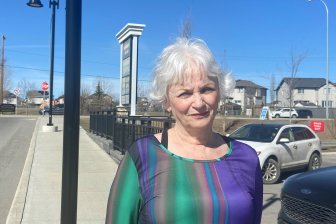For decades, the estimated 12,000 Indigenous members who served in the three major wars of the 20th century were not acknowledged on Nov. 11.

That’s why there’s a separate day to honour the underappreciated history, through an initiative that began in Winnipeg in 1994, and is now known as National Indigenous Veterans Day on Nov. 8.
Ahead of the special day of remembrance, Global News spoke with several service members in B.C. on what they described as an opportunity for all Canadians to reflect on their “often overlooked” sacrifices and learn from past mistakes.
UBC Social Work professor emeritus and military veteran Richard Vedan said it wasn’t until about halfway through his 11 years of service that he confirmed his ancestry as a member of Neskonlith Band, because his father decided to hide their Indigenous ancestry from his children.
Vedan says his dad, Hector, was a passionate hockey player and at age 17 the young man, who survived the residential school system, enlisted with the Rocky Mountain Rangers.
“From residential school where he had contracted rheumatic fever and had been bedridden for a full year, he had learned no matter how hard you work, what you do, you can’t change one basic element: your skin colour,” Vedan said.
According to Vedan, Hector’s service in the Second World War came after his boss fired him from his job in construction in Williams Lake, B.C.
“He said there are people saying why is there an Indian working when there’s white men who need a job,” Vedan said.
Hector married a British war bride and decided the best way to protect their children was to hide their heritage, never telling them they’re First Nations, Vedan said.
“When I was commissioned as an officer in the Royal Canadian Air Force in ’68, that was only eight years after my relatives and myself had been given the right to vote,” Vedan said.
Exempt from conscription, veterans of the First and Second World Wars volunteered to serve, while giving up their Indigenous status. Many Indigenous soldiers were also denied the same benefits as other returning veterans, while their reserve land was sold away.
“They were not afforded benefits the way other Canadians were through the Veterans Land Act. In many cases, what was identified as surplus Indian land was expropriated and sold to returning non-Aboriginal veterans,” Vedan said.
Vedan says his reflections on this special day of remembrance are around those inequities faced by generations of Indigenous veterans.
“First Nations, Inuit and Métis are leaving to go into harm’s way from a third world country without resources and coming back to the same circumstance,” Vedan said.
He says he’s also thinking of his own nieces and nephews struggling with post-traumatic stress disorder after serving in Afghanistan and Kosovo and returning to communities disproportionately affected by poverty and discrimination.
“The fundamental issues are never dealt with. Our people are still living in poor housing in a land base never designed to be supportive… people are thrust into urban and rural ghettos, reserves, with not enough resources,” Vedan said.
“Those discrepancies need to be addressed so there will be a time not to have a separate Indigenous veterans day.”
Acknowledging those sacrifices and injustices is what Nov. 8 is about, said Navy veteran and trauma counsellor Joy Dockrey.
“I didn’t tell anybody I was Indigenous at the time,” the Cree Elder told Global News.
Dockrey, who was adopted to non-Indigenous parents at age 5, said she was conceived in Vancouver’s notorious Downtown Eastside neighbourhood, referring to it as the “largest, most oppressed reserve in Canada,” and enlisted with the Navy at the suggestion of her adoptive parents.
She now coordinates the Lower Mainland Aboriginal Veterans Association and says Nov. 8 is an important opportunity to reflect on the “often ignored” history of Indigenous veterans.
“They had no benefits, health benefits, no land to call their own, still rampant racism and discrimination, no houses to live in, so what was the thing they did? They re-enlisted in the Korean War.”
Métis veteran Gladys Rosencrans said she proudly takes part in the Indigenous Veterans Day ceremony in Vancouver.
“It’s a chance to recognize and understand all our people gave and were not recognized for,” Rosencrans said.
Haida Elder and Navy veteran Lois Rullin highlights the progress that’s been made in recognizing the true history of Indigenous veterans as well as the work that remains.







Comments